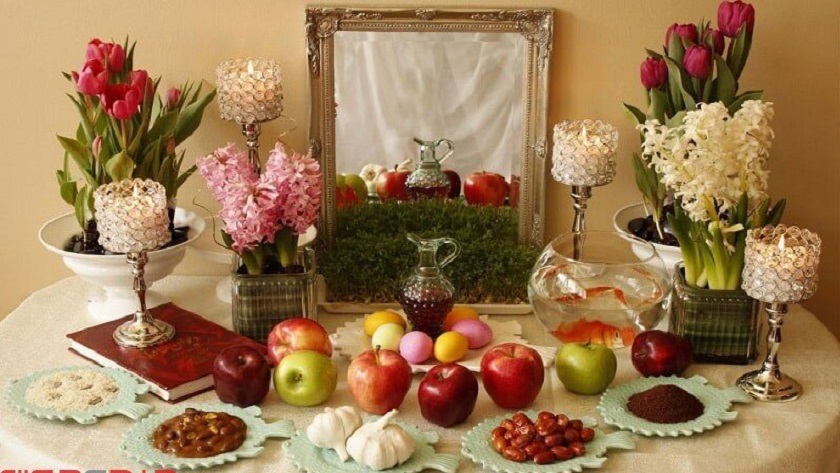Iran Press/ Iran News: In the name of God of spring, creator of flowers and greenery, God of flowing waters and rain clouds.
Every day is a new day, a day when everything can be started from the beginning, but none of these new days are "Nowruz". Nowruz is a new day that with its renewal, all nature becomes new.
 Iranian celebrate ancient Nowruz
Iranian celebrate ancient Nowruz
Flowers and trees bloom and green pastures sprout from the soil. The ice melts and rushes to the plains to feed trees, green leaves, and fresh fruit. All these and all the other things make the beholder happy to see the blessings that God has created for all human beings. All human beings, regardless of race, ethnicity, or language, have the right to enjoy these blessings and their beauty.
At the beginning of each solar New Year, Nowruz reminds many lessons for humans in the form of special rituals and traditions.
This thinking is exactly what is in conflict with monopolization and extravagance. A thought that is the basis of peace, freedom, friendship and equality of humans, and "Nowruz" has been the message of this idea for centuries.
Nowruz reminds people that they should leave the darkness, coldness and ugliness behind with all the hardships they had and think about a bright, green and beautiful future. Nature is a good teacher if people have ears to listen.
At the beginning of every new solar year, Nowruz repeats many lessons for us in the form of its special customs and rituals. One of these customs, from which many lessons can be learned, is setting the Haft Sin table.
 Iranians across the country celebrate Nowruz
Iranians across the country celebrate Nowruz
For centuries, Iranians have been setting a table every year, a few hours before the moment of delivery of the year, whose main components are seven things.
One of these rituals, from which many lessons can be learned, is setting the Haft-sin table. For centuries, every year, a few hours before the end of the year, Iranians spread a tablecloth with seven main components present on it.
Seven things whose name in Persian begins with the letter "S". Sabze( Sprouting /Grass), apples, Samanu, oleaster, sumac, garlic, and vinegar. But why did the Iranians choose these seven things for these special moments?
 Setting Haft-Sin table is main ritual of Iranians in Nowruz
Setting Haft-Sin table is main ritual of Iranians in Nowruz
Sabze symbolizes freshness
Sabze is a symbol of freshness and succulence, a symbol of the resurrection of nature.
Apple; a symbol of health
Apple is a symbol of health and wellness. Iranians wish everyone good health by placing a bowl full of beautiful and healthy apples on the Haft-sin table.
Samanu is a symbol of abundance
Another element present in Haft-sin table is Samanu. Samanu is a food similar to halva, which is prepared from wheat germ and is very nutritious and full of energy.
Garlic and vinegar symbolize cleanliness from pollution
"Garlic" and "vinegar" are both symbols for cleanliness and the removal of impurities.
Sumac and Oleaster are a symbol of love and altruism
In order to start a new life-like nature, we need to clean our hearts and souls of ugliness, darkness, and filth.
 Haft- Sin table is set by seven symbolic items whose names start with the letter S
Haft- Sin table is set by seven symbolic items whose names start with the letter S
Nowruz, inspiring friendship and helping others
If we take a social look at all the teachings offered by Nowruz, we can surely see better and more sincere relations among nations and governments, and in this way humans can establish sustainable peace.
Nowruz and the customs of nations
When Islam reached the land of the Iranians, It was these originalities and beautiful thoughts dormant in the tradition of Nowruz that caused Islam to approve of this tradition and introduce it as a time for prayer and supplication.
Nowruz arises from the idea of seeking justice, and this is what Islam has emerged for. That is why the Iranians, after getting acquainted with Islam, brought the Quran to the Haft-sin table, and since then the Quran and Haft-sin have never been separated.
Iranian also start the new year by reciting verses from God, Creator of spring, asking Him to bestow upon us freshness and beauty as that of nature.
Ashkan Salehian

